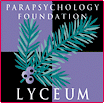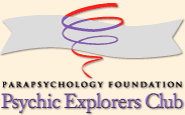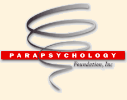 |
 |
| by Harvey J. Irwin, Ph.D.  Although my recent formal retirement from the University of New England in Australia has curtailed to some extent the opportunity to undertake empirical research I continue to monitor progress in the field of parapsychology and to participate in editorial and other facets of academic life. In writing this short professional autobiography I hope that my ongoing interest in the contemporary scene and the perspective provided by nearly thirty years of involvement in parapsychology may serve as one potential source of guidance to anyone wanting some insight into life as an academic parapsychologist. Although my recent formal retirement from the University of New England in Australia has curtailed to some extent the opportunity to undertake empirical research I continue to monitor progress in the field of parapsychology and to participate in editorial and other facets of academic life. In writing this short professional autobiography I hope that my ongoing interest in the contemporary scene and the perspective provided by nearly thirty years of involvement in parapsychology may serve as one potential source of guidance to anyone wanting some insight into life as an academic parapsychologist.
In the early 1960s I completed my first degree in science, specializing in psychology, at Sydney University. On completing high school my original aspiration was to become a teacher of mathematics to high school students and thus my enrollment at university focused on the basic sciences of mathematics, physics, and chemistry. The first year of study required participation in four subjects, so I had thought to supplement the three basic sciences with a unit in philosophy, as I had undertaken some preliminary reading of this discipline during my high school years. On the local rail trip to the enrollment session, however, friends suggested that a field of study called “psychology” might be of more use in my teaching aspirations than would philosophy. Thus, a casual conversation with my peers was to have a fateful impact on my future career. Within the first few weeks of lectures I had decided that psychology was my primary academic interest, and although I completed the other courses in science and even became a mathematics teacher for several years in order to absolve my scholarship obligations, I was to go on in the early 1970s to undertake doctoral research in the Psychology Department at the University of New England (UNE) on the topic of how people selectively attend to one aspect of their visual experience and seemingly ignore other aspects. By now you may be wondering where parapsychology featured in these considerations. In these early years of study I hadn’t even heard of parapsychology; certainly the topic of ESP was not broached by any of my lecturers nor in any of my prescribed reading at Sydney University. By the mid 1970s, however, experimentation with psychedelic drugs by many young people (although not including me) had led to the so-called “consciousness explosion” and states of consciousness, including mystical and parapsychological experiences, became a matter of great interest to the general public. Particularly in the USA a small number of psychologists even began to consider these experiences as a legitimate issue for research. Coincidentally, while working at UNE I discovered that a colleague, Dr Maurice Marsh, had completed a PhD at Rhodes University in South Africa on experimental ESP and he was presenting occasional lectures on parapsychology in his course on abnormal psychology. The confluence of these events inspired me to give some thought as to how parapsychological experiences might be accommodated under contemporary psychological approaches to cognition. Drawing on an understanding of human cognition I had derived during my research on selective attention, I published some theoretical papers and a book on psi (ESP and psychokinesis or PK) in relation to the human information processing system. Subsequently I undertook a couple of rather ambitious experiments on cognitive aspects of experimental psi, but the computerized psi tests in vogue at that time struck me (and no doubt my experimental participants) as so mind-numbingly tedious that I turned my attention to the study of the occurrence of parapsychological experiences in everyday life and the nature of people’s belief (and indeed, disbelief) in the paranormal. And what of my own paranormal beliefs? This is a source of great amusement to some of my parapsychological colleagues, but I am still something of an agnostic in this regard. Further, there is no real disparity between my emotional (intuitive) and intellectual (reflective) reactions to the paranormal. That is, I do not intuit any personal paranormal beliefs from my own (or indeed, significant others’) parapsychological experiences but rather, I am content to rely on my extensive assessment of the relevant empirical research (see my Introduction to Parapsychology) as the grounds for my personal views. And despite the ingenuity and laudable dedication of many parapsychologists over many decades the existence of paranormal processes still is a matter of conjecture, it seems to me. I do not endorse the rhetoric of my more skeptical colleagues who dismiss psi experiments out of hand as having irredeemably unsound methodology, but I am yet to be convinced that the effects educed in the parapsychological laboratory are necessarily conclusive for the existence of the process we call ESP or that called PK, for example. Other explanations, such as the Jungian notion of synchronicity, are at least feasible and until parapsychologists can determine the mechanisms by which psi information is mediated between a source and the experient, the psi hypothesis will remain a theoretical option rather than an established fact. Given my agnosticism, there remains to be explained my basic interest in parapsychology. “Intellectual curiosity” would be my best guess, but a more searching analysis would have to take some account of underlying personality processes. One consequence of my early training at Sydney University is an enduring susceptibility to psychodynamic accounts of human behavior. So, I must ask if my childhood experiences provide a sufficient account of my parapsychological interests. Unlike some parapsychologists I did not have a childhood marked by frequent and diverse parapsychological experiences. I can recall a single out-of-body experience when I was about 10 years old. One humid Sydney evening I tossed and turned in my bed, trying desperately and ineffectually to get to sleep, when suddenly I had the impression that “I”, my experiencing self, was located near the ceiling at the opposite corner of the room and looking down at my body on the bed. I felt a sense of surprise that such a thing could happen, and with that thought the experience immediately came to an end. At other times throughout my life I have encountered the occasional seemingly extrasensory experience, but as each of these could easily be dismissed as a coincidence they certainly did not generate sufficient intellectual excitement to inspire a career path. As a child I was encouraged by my parents to attend “Sunday School” for religious instruction at the local Congregational church, and for a brief period in adolescence I did have an interest in metaphysics, but there was no fundamentalist religious streak here that might later have been subverted to a paranormal bent. I am happy also to report that my childhood was free from major trauma and abuse, a factor that has been linked by researchers to belief in the paranormal. Of the empirically identified childhood predictors of paranormal belief and parapsychological experiences, the only personal characteristic with which I can identify is a tendency toward fantasy proneness, and needless to say, I would rationalize this propensity in terms of a rich imagination rather than as a psychological defense mechanism (although I do remain ready to negotiate on this point). Whatever may be the psychodynamic origins of my parapsychological interests they must have been reasonably potent to sustain my involvement in the field of parapsychology for some thirty years. Given the persistence of this interest, would I recommend that anyone follow my example? For people with the prerequisite levels of ability, motivation, and resilience I can say “yes”, but not without voicing some important provisos. Many academic parapsychologists have been subjected to discrimination in the workforce because their field of research has been deemed unacceptable or an embarrassment to their university colleagues. These negative reactions may impact harshly on the parapsychologist’s prospects for tenure, promotion, and the funding of his or her research. There were minor instances of such effects during my own career and although they were irksome at the time I believe in retrospect they did little to impede my progress in the long run, for several reasons. First, throughout my career I engaged not only in parapsychological research but also in a variety of mainstream psychological projects concerning such topics as cognitive processes, the psychology of bereavement, psychopathology, and criminal profiling. Perhaps this went some way to assuring a few of my colleagues that I was not some closet occultist intent upon bringing into disrepute my own university department and the science of psychology as a whole, although this state of relative truce was achieved gradually over a period of some years. Second, at no time did I act as a highly visible public advocate for a paranormal worldview; the “crusader archetype” simply is not a facet of my personality, and on most occasions I declined journalists’ requests for an interview and invitations for open debates on the paranormal. In any event I have never seen the role of the parapsychologist to be the implacable pursuit of “proof” of the paranormal. Rather, I both thought and behaved as a more dispassionate, evenhanded scientific investigator of tentative hypotheses about ostensibly paranormal phenomena. Undoubtedly this approach to parapsychology is insufficiently contentious to appeal to mass media journalists and conveners of public debates, but I believe it played a significant role in my academic survival. The only alternative successful tactic here seems to be to play the role of the dogmatic archskeptic; this seems to earn commendation from fellow academics and journalists alike. Although extreme skepticism is not a role I could have adopted in all good conscience, other academics have used it effectively as a rationale for their parapsychological interests. A third factor in my academic survival was that I engaged in empirical research largely for reasons of personal fascination. Thus, I was not motivated to pursue large research grants that would turn my laboratory into a research factory with the hard labor performed by an army of industrious subordinates. The relatively small research grants allocated within the university were usually sufficient to cover the costs of my research program, provided I was prepared to do much of the so-called menial work myself. In an increasingly competitive research environment today, however, success in attracting large grants is generally deemed an essential criterion for career advancement. Finally, because UNE is set in a small rural town far from national and international centers of academia, I probably seemed too insignificant to become a major target for attack either by the skeptical movement or by parapsychologists whose parapsychological agenda differed from my own. Had I worked in Sydney or Melbourne I may well have become the focus of greater antagonism. Embracing an evenhanded scientific approach to parapsychology and maintaining a relatively low profile certainly can not guarantee immunity from vocational discrimination, but if the foregoing considerations sit well with the aspiring parapsychologist’s person style I can testify to the possibility of achieving an immensely satisfying career with parapsychological interests supplemented by more mainstream interests. My views of course are based almost entirely on experience in the Australian academic scene; somewhat different factors may well apply in other contexts. People whose needs, values, and personality traits contrast strongly with my own may also need to take these characteristics into account. Nevertheless, I hope this brief account of my own career provides some reassurance and inspiration. Irwin, H. J. (2006). The psychology of paranormal belief (Parapsychological Monographs No. 20). New York: Parapsychology Foundation. Irwin, H. J. (2004). An introduction to parapsychology (4th ed.). Jefferson, N.C.: McFarland. Irwin, H. J., & Young, J. M. (2002). Intuitive versus reflective processes in the formation of paranormal beliefs. European Journal of Parapsychology, 17, 45-53. Irwin, H. J. (2001). Parapsychology as a career. Australian Journal of Parapsychology, 1, 2-8. Irwin, H. J. (2000). The end: A view from parapsychology. In A. Kellehear (Ed.), Death and dying in Australia (pp. 342-354). Melbourne: Oxford University Press. Irwin, H. J. (1985). Flight of mind: A psychological study of the out-of-body experience. Metuchen, N.J.: Scarecrow Press. Irwin, H. J. (1979). Psi and the mind: An information processing approach. Metuchen, N.J.: Scarecrow Press. ************ Prepared for the “Lives in Parapsychology” Blog first posted on June 26th, 2006. |
 |

|
 www. parapsychology. org |
||